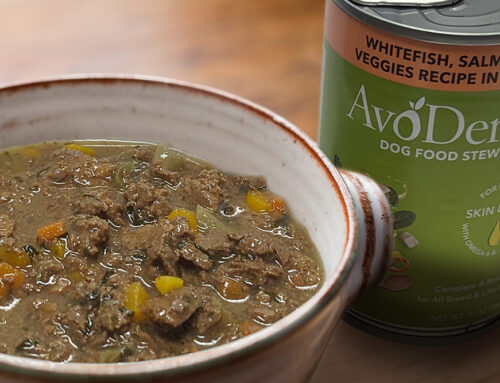Your dog’s comfort is always top of mind. So when you see him chewing his paws, rolling to scratch an itch, or pawing at a runny nose, you might wonder if he’s battling allergies.
According to Judy Morgan, a holistic veterinarian and author who advocates ways in which nutrition can increase your pet’s wellness, “repeated exposure to a substance which causes a reaction by the immune system” is often to blame for allergic reactions.
Telltale symptoms of dog allergies, she says, include the following:
- dry skin
- moist skin
- malodorous discharge from the eyes
- ear infections
- scratching and chewing
- rhinitis (inflammation of the nasal cavity)
- vomiting and/or diarrhea
If your dogs suffers from any of these allergy symptoms, you can help by examining his diet, considering supplements and paying closer attention to his grooming routine.
3 Ways to Prevent Dog Allergy Symptoms
1. Consider a natural, canine-appropriate diet
We adore our pets, and enjoy spoiling them. But sharing a slice of pizza or piece of cake with a dog isn’t a good idea. Morgan says that dogs generally need a meat- based diet.
Pet foods that contain ingredients dogs ate when living off the land before being domesticated seem to work best. This includes a varying diet of proteins, vegetables and fruits. AvoDerm Natural® Revolving Menu® dog food gives your pet protein variety that may help him avoid food sensitivities. This line features grain-free and gluten-free recipes, including the Triple Protein Meal Formula and the Salmon Meal & Potato Formula, which, unlike other brands of dog food, are specially formulated and won’t cause allergies or upset your dog’s stomach when you switch between formulas.
2. Be cautious about supplements
Giving your dog extra nutrients beyond his daily diet could help his health, but doing so might also impede it. Supplements such as Omega-3 fatty acids and probiotics are popular, but if you choose to try these supplements, watch your pet closely for signs of an allergy.
“Omega 3 fatty acids are wonderful to help decrease inflammation,” says Morgan, “but I actually have quite a few patients that are allergic to fish oils and any ocean- based products, like kelp.”
When it comes to probiotics, according to Morgan, “seventy to 80 percent of the immune system lies in the gut, so probiotics and digestive enzymes can keep the gut healthy and happy, decreasing allergic reactions.”
3. Groom your dog regularly
Taking a hands-on approach by brushing and bathing your pet regularly can also help prevent allergies. Bathing your pet helps remove pollen from fur and skin.
“Pollen, when looked at microscopically, is very jagged and has sharp points, which are very irritating to the skin,” Morgan notes.
Wiping your dog’s paw when he comes in from outside, and keeping the fur between his toes trimmed can also keep pollen at bay, as well as reduce moisture build-up that can cause discomfort for your pet.
Food ingredients or additives can cause your pet discomfort, as can sensitivity to pollen and grass. Examining your dog’s diet, from his daily food and treats to nutritional supplements, is the first step in determining if he has food allergies. For a complete evaluation and diagnosis of your dog’s symptoms, schedule a visit with your veterinarian.





